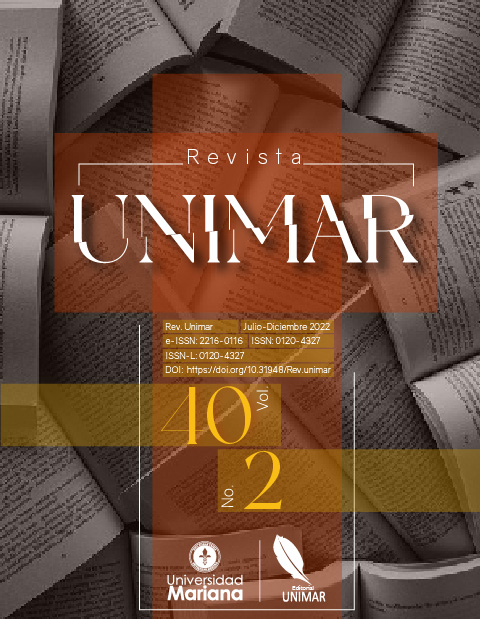Epistemological conceptions and characteristics of the pedagogical practices of teachers
DOI:
https://doi.org/10.31948/Rev.unimar/unimar40-2-art8Keywords:
epistemological conceptions, pedagogical practices, teachersAbstract
This article, the result of an investigation of the epistemological conceptions and characteristics of the pedagogical practices of teachers in the teaching of natural and social sciences in basic secondary education, is a vision of how teachers promote the teaching and learning of sciences, according to their professional and academic training. One of the characteristics of teacher training is the lack of qualification in their professional field, subject to obsolete practices that, in many cases, have demotivated teachers and students. To investigate this problem, it is necessary to mention its causes; the first of them was found in the praxis related to what the teacher thinks and assimilates as truth in his/her practice, which could be interference between what he/she intends and what he/she actually obtains, resulting in not using novel methods for being linked to processes that, in their formative stage, could have worked. Methodologically, this research is qualitative with a historical hermeneutical approach; the information was collected through techniques and instruments such as documentary review, surveys on epistemological conceptions, and characterization of pedagogical practices. Among the results, it was found that the concept used by teachers about science in this study is much more hermeneutic than positivist. Regarding the method of science, heterogeneity was observed in the answers, evidencing a rooting in traditionalism in the positivist conceptions of some of them, which is often related to their type of learning of science, decades ago. Regarding pedagogical practices, despite the fact that the majority of teachers handle a constructivist discourse, it was possible to identify that what is reflected in institutional documents such as curricula and didactic units, still presents elements of traditional educational practices.
Author Biographies
Juan David Galvis Benavides, Colegio Filipense, Ipiales
Magíster en Pedagogía. Docente del Colegio Filipense, Ipiales, Colombia.
Nixon Alexander Guerrero Pasuy
Magíster en Pedagogía. Independiente, Colombia.
References
Aiello, M. (2004). Concepciones epistemológicas del docente y su incidencia en la enseñanza de las ciencias. Revista Colombiana de Educación, (47). https://doi.org/10.17227/01203916.5520
Arias, D. H. (2015). La enseñanza de las ciencias sociales en Colombia: lugar de las disciplinas y disputa por la hegemonía de un saber. Revista de Estudios Sociales, (52), 134-146. https://doi.org/10.7440/res52.2015.09
Barrón, C. (2015). Concepciones epistemológicas y práctica docente. Una revisión. REDU, Revista de Docencia Universitaria, 13(1), 35-56. https://doi.org/10.4995/redu.2015.6436
Duque, P. A., Rodríguez, J. C. y Vallejo, S. L. (2013). Prácticas pedagógicas y su relación con el desempeño académico. Centro de Estudios Avanzados en Niñez y Juventud, alianza de la Universidad de Manizales, CINDE.
García, M. y Rivas, N. J. (2003). Concepciones epistemológicas y enfoques educativos subyacentes en las opiniones de un grupo de docentes de la UPEL acerca de la enseñanza, el aprendizaje y la evaluación. Investigación y Postgrado, 18(1), 11-21.
Marroquín, M. y Valverde, O. (2018). Las concepciones epistemológicas, pedagógicas y didácticas del mejor profesorado de las universidades acreditadas en Colombia. Folios, (49), 19-40. https://doi.org/10.17227/folios.49-9388
Martínez, C. y González, C. (2014). Concepciones del profesorado universitario acerca de la ciencia y su aprendizaje y cómo abordan la promoción de competencias científicas en la formación de futuros profesores de Biología. Enseñanza de las Ciencias, Revista de investigación y experiencias didácticas [en línea], 32(1), 51-81. https://doi.org/10.5565/rev/ensciencias.852
Ministerio de Educación Nacional (MEN). (s.f.). Estándares básicos de competencias en ciencias naturales y ciencias sociales. https://www.mineducacion.gov.co/1621/articles-116042_archivo_pdf3.pdf
Paredes, G., (2009). Positivismo y hermenéutica. Divergencias ontológicas, metodológicas y epistemológicas. Revista Ágora Trujillo, 12(23).
Porlán, R. (1989). Teoría del conocimiento, teoría de la enseñanza y desarrollo profesional. Las concepciones epistemológicas de los profesores [Tesis Doctoral Inédita, Universidad de Sevilla]. https://idus.us.es/handle/11441/85207
Straus, A. y Corbin, J. (2016). Las bases de la investigación científica. Editorial Universidad de Antioquia.
Soneira, A. J. (2006). La teoría fundamentada en los datos (grounded theory) de Glaser y Strauss. En I. Vasilachis. Estrategias de investigación cualitativa (pp. 153-173). Editorial Gedisa.
Trejo, H. (2020). La utilidad de la filosofía de la ciencia en contextos de postverdad. Revista Redipe, 9(5), 42-54. https://orcid.org/0000-0001-7868-5845
How to Cite
Downloads
Downloads
Published
Issue
Section
License

This work is licensed under a Creative Commons Attribution 4.0 International License.
Los autores que publiquen en esta revista aceptan las siguientes condiciones:
1. Los autores conservan los derechos de autor y ceden a la revista el derecho de la primera publicación, con el trabajo registrado con la licencia de atribución de Creative Commons, que permite a terceros utilizar lo publicado siempre que mencionen la autoría del trabajo y a la primera publicación en esta revista.
2. Los autores pueden realizar otros acuerdos contractuales independientes y adicionales para la distribución no exclusiva de la versión del artículo publicado en esta revista (p. ej., incluirlo en un repositorio institucional o publicarlo en un libro) siempre que indiquen claramente que el trabajo se publicó por primera vez en esta revista.
3. Se permite y recomienda a los autores publicar su trabajo en Internet (por ejemplo en páginas institucionales o personales) antes y durante el proceso de revisión y publicación, ya que puede conducir a intercambios productivos y a una mayor y más rápida difusión del trabajo publicado (veaThe Effect of Open Access).
| Article metrics | |
|---|---|
| Abstract views | |
| Galley vies | |
| PDF Views | |
| HTML views | |
| Other views | |




